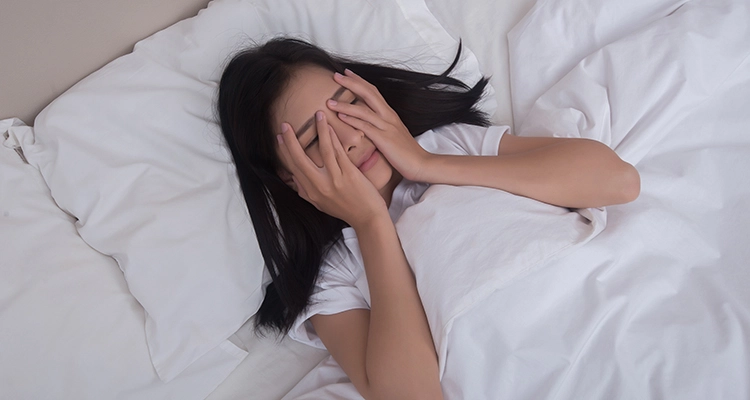Everything You Need to Know About Oxycodone and Sleep
Chronic pain affects over 50 million adults or 20% of the population. From neck and back pain to chronic arthritis, pain can be debilitating, causing many people to reach for the medicine cabinet. Oxycodone is a popular narcotic used to treat severe pain. Unfortunately, it also has the highest risk of dependency and addiction. It may even cause respiratory distress when taken in high doses or mixed with other substances like alcohol.

Even with these risks in mind, many chronic pain sufferers use oxycodone for much-needed relief. Especially when chronic pain is causing other serious conditions like insomnia. Persistent pain can make it nearly impossible to fall and stay asleep. Not only does pain make it difficult to find a comfortable sleep position but it can wake you throughout the night. While oxycodone may help ease pain symptoms and help you achieve a better night’s sleep, it’s not a proven way to treat long-term insomnia. In fact, if you’re not suffering from pain at all, using oxycodone to treat insomnia can be dangerous.
Keep reading to learn the proper uses for oxycodone when treating chronic pain associated with insomnia and other important information.
Content
Oxycodone Uses
As we already mentioned, oxycodone is a powerful and popular narcotic used to treat chronic pain. Oxycodone is only used when other pain management techniques and medications have proven ineffective. Oxycodone belongs to a group of medications also known as narcotic analgesics. By interacting with your central nervous system, this strong medication can help relieve extreme pain. Relieving this pain can help those suffering from insomnia and other sleep disturbances finally achieve a consistent, quality night’s sleep.

With oxycodone, use comes with the risk of developing an addiction or dependency. Many users come to rely on oxycodone as a means to function on a daily basis. They soon develop fear and anxiety over not being able to achieve the same level of sleep and relief without it. This anxiety only worsens insomnia symptoms and leads to a greater risk of dependency.
Long-term use may also cause a physical dependency. In order to avoid dangerous withdrawal symptoms, oxycodone users must slowly wean off this medication.
How Oxycodone Affects Sleep
Oxycodone is a type of opioid which means that it’s produced from the poppy plant. What makes oxycodone different is that it’s clinically modified to offer faster, more concentrated results than other opiates. Oxycodone is prescribed to treat pain but because of its powerful effects, many addicts use this opioid recreationally.

While oxycodone does cause excessive drowsiness, it can also cause major sleep disturbances including insomnia. After several nights of restless sleep, many insomnia sufferers that are also using oxycodone feel drained, lethargic, and unable to focus the next day. This may also weaken your immune system, leaving you more susceptible to illness and less likely to recover.
Even if oxycodone helps you fall asleep, it doesn’t improve your quality of sleep. Adversely, it makes your sleep worse. Opioids like oxycodone lower the rate of REM and slow-wave sleep. It’s during slow-wave sleep that your body rests and recharges. With it, you’ll wake up feeling lethargic, irritable, and anxious.
If you suffer from undiagnosed sleep apnea, you make up approximately 20% of the American population. Taking oxycodone and other opioids can make it even more difficult to breathe, putting you at greater risk for heart failure and death. One study suggested that the more frequently a person uses oxycodone, the more sleep apnea episodes they have. Oxygen levels in these patients drastically dropped approximately 15 minutes after taking an opioid during the night.
Patients using oxycodone for pain who try increasing their dose to achieve better sleep are at high risk of addiction, dependency, and even an overdose.
Side Effects of Oxycodone
It’s no surprise that oxycodone and other opioids have some pretty serious side effects given their strength. Some of the most common side effects of oxycodone are:

- Dizziness/faintness
- Sweating
- Headache
- Stress/anxiety
- Drowsiness or insomnia
- Itching
In patients who develop an addiction to oxycodone, these symptoms may become more intense.
Safe Alternatives for Pain and Insomnia Relief
If you’re faced with debilitating pain or insomnia, there are other, safer alternatives than taking oxycodone. Many people aren’t comfortable with the risk of dependency and other dangers. Having alternative options on hand lets you make an informed decision that you’re comfortable with.

Alternative Pain Relief Options
Acute pain is commonly caused by a recent injury, surgery, or illness. Most pain will subside over time but if it persists, you may be desperate for relief — especially if the pain you’re experiencing is making it impossible to sleep.
Treating the underlying cause of your pain is the first step in achieving relief without medication. Treatment for the cause of your pain may also help you achieve a better night’s sleep. For example, if you suffer from insomnia paired with nerve pain, certain low-risk medications can both treat the pain and induce sleep.
Avoid combining medications. If you’re already taking oxycodone for pain, avoid taking additional sleep aids including Xanax or Valium. This can cause dangerous, life-threatening side effects. This combination also increases your risk of respiratory issues, which is especially dangerous for individuals suffering from sleep apnea.
Alternative Treatment for Insomnia
With over 70 million people suffering from insomnia, if you’re facing this sleep disorder plus extreme pain, you’re probably in search of alternative relief that doesn’t require medication.
Most resolutions involve altering your lifestyle and making smarter choices. Get plenty of physical activity and exercise during the day. Adopting a healthy balanced diet promotes your overall health and wellbeing. Avoid eating too late at night or consuming caffeine. Smoking is not only a dangerous habit but nicotine can act as a stimulant, making it difficult to fall and stay asleep. It’s also best to avoid screens too close to bedtime. If possible, go to sleep and wake at the same time each day.
If pain is keeping you awake at night, avoid laying in bed for longer than 20 minutes at a time. Instead, get up and walk around or perform a relaxing behavior. Meditating, reading, going for a short walk, or drinking a cup of chamomile tea can help reduce your stress and better prepare you for sleep. Once you feel tired, return to the bedroom and try again to get into a comfortable sleep position. This will help your mind and body associate your bedroom with sleep.
All of these steps can help improve your quality of sleep and reduce pain.
Treat Pain and Insomnia without Oxycodone
In cases of extreme pain and discomfort, oxycodone may be your ticket to relief. Before you take oxycodone for pain, you should discuss other options with your doctor as well as the side effects and risks associated with opioid use. Because of oxycodone’s strength, taking this narcotic for insomnia is not recommended. In some cases, oxycodone can actually aggravate insomnia symptoms. You also run the risk of becoming dependent or addicted.

Instead of grabbing the pill bottle, try treating the underlying cause of your pain or insomnia. At Somnus Therapy, we help you identify, understand, and accept your insomnia diagnosis. We also offer a wide range of therapy and treatment options to suit every need.
If you need help achieving a blissful night’s sleep (which may also help relieve pain symptoms), we can help. Click here to start your journey today.













